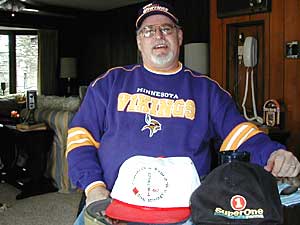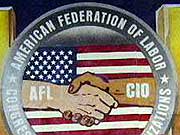|
Audio
Photos
More from MPR
Resources
Respond to this story
|
Will work for health insurance
January 27, 2004
 |
| Paul Thomas lost his job when the LTV mine closed in Virginia, Minnesota, and in the process he also lost his health insurance. (MPR Photo/Bob Kelleher) |
Virginia, Minn. — If you grew up in Virginia, Minnesota, you might know Paul Thomas. He's about 50 now -- getting a bit thicker in the waist -- with frosty hair and a closely trimmed goatee. His wife says he's just a big kid. You can often spot Thomas at the SuperOne grocery.
"So, I come up to you and I ask you if you want paper or plastic," Thomas says. "And I found myself saying, 'Geez, this is almost as bad as McDonalds,' and saying, 'You want fries with that?'"
It's a big change for Thomas. He'd put in more than 20 years at LTV Steel Mining. Thomas made good money and earned generous benefits. He looked forward to a comfortable retirement, with a good pension and a health plan. But LTV is gone now, and with it the health plan for thousands of retirees. Now, Thomas is bagging groceries -- a job that comes with health insurance.
"You have to swallow your pride," Thomas says. "And you swallow your pride at the same time you say, 'This is my only way to survive.'"
 | |||
Thomas does collect a pension, thanks to a federal government bailout. But it's less than $900 a month -- not nearly enough to keep pace with skyrocketing health care costs. A three-month supply of his prescription cholesterol medication costs $500.
"After a while I even stopped. Even without my doctor's permission, I stopped taking Lipitor," Thomas says. "My wife got totally furious with me, because I just did it on my own. But at the same time, I took a choice of paying for the fuel oil or medicine."
You don't work the mines because you want to. The job is dirty and dangerous. Taconite plants run 24 hours a day, every day. Thomas says he worked for the benefits -- benefit packages hammered out by the United Steelworkers of America union.
Thomas is plenty angry, but not at the union. When LTV closed, he says, the union was there to help. Union leaders negotiated a little better pension for Thomas, pushed for extended unemployment, and helped develop career training for laid-off workers.
"But at the same time they are handcuffed," says Thomas. "They're saying, 'OK, with the company shut down, we can't do anything more.'"
 | |||
The union's role faded quickly when the company went away.
Jim Shackman is looking for something to do. He put in more than 30 years at LTV and its predecessor, but he'd planned to put in a few more. The faint ticking of homemade clocks reminds Shackman that now, he has plenty of time on his hands.
He's still trim at 55, with a full mustache and grey streaks sneaking in to his receding hair. Shackman's perfectly able to work, but he suspects the good jobs are going to younger people. Technically, Shackman's retired. But he's really too young to retire and too old to start over. Shackman takes temporary work when he can find it.
"With the part-time jobs that I've picked up here and there, it isn't that uncomfortable. It's just that we're not being able to get a lot of things that we should probably update," Shackman says. "It's hard. Like the winter rolls around. The heating bill, and some extra money you've got to put in for maintenance on the furnace that's unexpected."
The kids are grown up, so it's just Jim and Deidre, his wife. But they have to be careful. They have no health insurance. Deidre was injured in a traffic accident a couple of years ago. She's OK now. But insurance companies won't offer a health policy for less than $600 or $700 a month. And that's with a deductible well over $1,000.
"For the coverage like we had at the mine, it would have virtually eaten up my pension check, for the both of us," says Shackman.
|
We have this era now that says that these poor companies have this sudden legacy fund. It was called a pension obligation when I agreed to work for these guys.
- Matt Crep, former LTV worker |
Deidre Shackman earns a little cash by helping a neighbor who uses a wheelchair. And Jim has worked short term jobs - on the county road crew, or mowing and such for a local township. It's cash for necessities, and emergencies.
"Try to stay healthy," Shackman says. "My wife had mentioned about playing volleyball, but she'd be afraid of getting hurt. I told her, 'Well, if that happened, we'd just figure out.' A broken bone, if that happened, a fracture, we'd just go to the doctor and pay the bill."
Fortunately, the Shackmans are a minority in Minnesota. The state claims the nation's highest percentage of residents with some kind of health coverage -- more than 90 percent. Programs like Minnesota Care were created for those who just can't find health care elsewhere.
But Shackman hasn't applied for MinnCare because of its asset limitations. So he and his wife are taking a chance. He wishes the steelworkers had done more. He knows they couldn't.
"With this cut in pensions, I don't know what they could have done, what could have been done," says Shackman. "When something like this happens -- when the plant files bankruptcy, and they're virtually non-existent I guess anymore, where do you go?"
You might think LTV's displaced workers are disappointed with the United Steelworkers of America. There's plenty of disappointment, but it's not with the union. It's directed at the corporations and the government.
"I would say, guys my age, there's bitterness. There has to be," Matt Crep says.
Matt Crep is a little better off than most. He's checking the jobs at the Minnesota Workforce Center in Virginia. An industrial electrician at LTV, he stood to get a pretty good pension. He's getting far less than promised, but enough to get by on it. But he doesn't. Crep commutes 200 miles to the Twin Cities for temporary electrician jobs. He's not crazy about the drive, or the motels. He fumbles an empty coffee cup and looks straight ahead.
"Pension stuff bothers people. It bothers people because we have this era now that says that these poor companies have this sudden legacy fund. It was called a pension obligation when I agreed to work for these guys," says Crep.
There's not a lot of trust left on the Iron Range. Long-held obligations vanished under a judge's pen. And the government, Crep says, lets it happen.
"The first thing our government allows these companies to do is take care of that obligation, that suddenly has become this pie in the sky deal that they don't feel they're obligated to anymore," says Crep. "And that causes a lot of bitterness."
The Steelworkers rallied in Virginia, not long after LTV shut down. Union leaders and politicians all vowed it would never happen again. No retiring workers should face old age without promised support.
But it's happened again. Twice. Two more mining companies went bankrupt. National Steel dissolved. Then Evtac. More pensions were cut, and health benefits vanished.
Iron miners aren't saying, "never again" on the Iron Range. Instead they're asking, "who's next?"
|
News Headlines
|
Related Subjects
|

